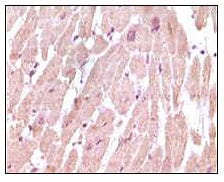
| WB | 咨询技术 | Human,Mouse,Rat |
| IF | 咨询技术 | Human,Mouse,Rat |
| IHC | 1/200 - 1/1000 | Human,Mouse,Rat |
| ICC | 技术咨询 | Human,Mouse,Rat |
| FCM | 咨询技术 | Human,Mouse,Rat |
| Elisa | 1/10000 | Human,Mouse,Rat |
| Aliases | CMH7; RCM1; cTnI; CMD2A; TNNC1 |
| Entrez GeneID | 7137 |
| clone | 3A10A12 |
| Host/Isotype | Mouse IgG1 |
| Antibody Type | Primary antibody |
| Storage | Store at 4°C short term. Aliquot and store at -20°C long term. Avoid freeze/thaw cycles. |
| Species Reactivity | Human |
| Immunogen | Purified recombinant fragment of cTnI expressed in E. Coli. |
| Formulation | Ascitic fluid containing 0.03% sodium azide. |
+ +
以下是关于cTnI(心肌肌钙蛋白I)抗体的3-4篇文献的简要列举:
1. **"Development of monoclonal antibodies for the detection of human cardiac troponin I"**
- **作者**: Apple FS, et al.
- **摘要**: 该研究描述了针对人cTnI特异性表位的单克隆抗体的开发,验证了其在心肌梗死诊断中的高灵敏度和特异性,为商业化检测试剂盒奠定了基础。
2. **"Characterization of cardiac troponin I antibodies for high-sensitivity assays"**
- **作者**: Christenson RH, et al.
- **摘要**: 通过分析不同cTnI抗体的结合亲和力和表位选择,优化了高灵敏度免疫检测方法,显著提高了低浓度cTnI的检出能力,助力早期心肌损伤诊断。
3. **"Impact of antibody selection on cardiac troponin I assay performance in clinical settings"**
- **作者**: Wu AHB, et al.
- **摘要**: 比较了多种抗cTnI单克隆抗体在临床检测中的表现,发现针对cTnI稳定区域的抗体可减少检测干扰(如溶血或异嗜性抗体),提升结果准确性。
4. **"Novel nanobody-based detection of cardiac troponin I for point-of-care testing"**
- **作者**: Li Y, et al.
- **摘要**: 提出了一种基于纳米抗体(单域抗体)的新型cTnI检测技术,具有快速、便携的特点,适用于床旁诊断,并展示了在急性冠脉综合征中的潜在应用价值。
以上文献覆盖了抗体开发、检测优化、临床验证及新技术整合等多个研究方向。
Cardiac troponin I (cTnI) is a highly specific biomarker for myocardial injury, widely used in diagnosing acute coronary syndromes and myocardial infarction. As a subunit of the troponin complex, cTnI regulates cardiac muscle contraction by inhibiting actin-myosin interactions. Its unique amino acid sequence distinguishes it from skeletal muscle troponin isoforms, enabling cardiac-specific detection.
The development of cTnI antibodies revolutionized cardiovascular diagnostics. Early polyclonal antibodies faced cross-reactivity issues with skeletal troponin, but advances in hybridoma technology enabled the production of monoclonal antibodies with superior specificity. These antibodies target stable epitopes in the cTnI molecule, such as the central hydrophobic region (residues 30-110) or the stable C-terminal domain, ensuring reliable detection even in degraded samples.
Modern cTnI immunoassays typically employ paired antibodies in sandwich configurations. High-affinity capture antibodies bind cTnI, while detection antibodies labeled with enzymes or fluorophores enable quantification. The evolution of antibody engineering, including recombinant and humanized formats, has enhanced assay sensitivity (now detecting ng/L concentrations) and reduced interference from heterophilic antibodies or autoantibodies.
Standardization remains challenging due to cTnI's post-translational modifications (phosphorylation, proteolysis) and assay platform variability. Ongoing research focuses on antibodies recognizing modified epitopes to improve clinical correlation. Point-of-care cTnI tests utilizing optimized antibody pairs facilitate rapid triage, underscoring cTnI antibodies' critical role in modern cardiology.
×